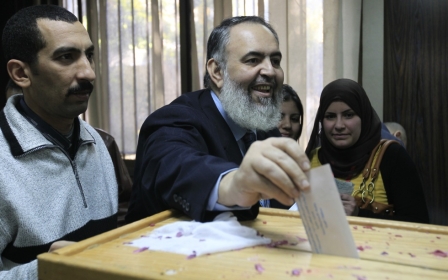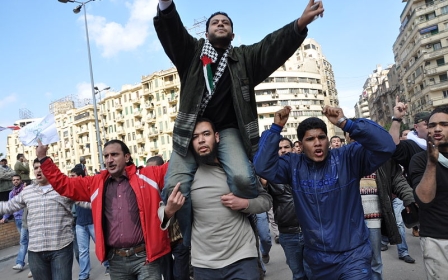Egypt jails ex-presidential candidate

An Egyptian court on Wednesday jailed Salafist leader Hazim Abu Ismail to seven years for fraud for keeping his mother's US citizenship secret when filing candidacy papers in Egypt's 2012 presidential election.
The country's electoral law stipulates that a candidate's parents must hold only Egyptian citizenship.
Judicial sources said Hazim Abu Ismail was sentenced for not revealing his mother's nationality when he filed to stand in the 2012 vote that was won by the Islamist Mohamed Morsi.
Abu Ismail was arrested after the army ousted Morsi last July. He had denounced Morsi's removal as a "military coup".
Abu Ismail’s supporters reacted to the court ruling with anger.
New MEE newsletter: Jerusalem Dispatch
Sign up to get the latest insights and analysis on Israel-Palestine, alongside Turkey Unpacked and other MEE newsletters
“The Egyptian judicial system has always been unjust,” said Waseem Aboudy, a supporter of Abu Ismail via Facebook.
Meanwhile, Morsi said he would not recognize last summer's "coup" that unseated him, nor would he "barter" the blood of slain revolutionaries, his son Osama quoted him as saying on 16 April.
"My father asks the Egyptian people for three things: don't recognize the coup, don't back down on the revolution, and don't barter the blood [of slain revolutionaries]," Osama declared via Facebook.
Morsi currently faces multiple criminal charges, including incitement to murder, jailbreak and espionage.
At Wednesday's court session, Morsi reiterated that his overthrow by the army last summer amounted to a "military coup," going on to tell judges that the overthrow was destined to fail.
"Please give my greetings to the Egyptian people, to whom I pay tribute for their peaceful revolution," Morsi – speaking from a soundproof glass cage – told the presiding judge.
"I assure the Egyptian people that the coup will eventually fail and its leaders will be held to account," he said.
While Morsi's supporters describe his ouster as a "military coup" his critics term it a "military-backed revolution."
On Wednesday, the court adjourned until April 22 trial proceedings for Morsi and 35 others accused of espionage.
Morsi and his co-defendants emphatically deny the charges arrayed against them, which they describe as politically motivated.
120 Morsi supporters jailed
At the same time, a court jailed 120 supporters of the deposed Islamist president for three years over clashes that left dozens of people dead last year, officials said.
The trial is part of a relentless crackdown that has targeted Morsi's supporters since the army ousted him in July.
The defendants were sentenced over clashes pitting Islamist protesters against the security forces and civilian opponents that killed 24 people and wounded 90 in the central Cairo district of Dokki on October 6, the judicial officials said.
Six other defendants were acquitted, and those sentenced can appeal the verdict.
A total of more than 50 people were killed that day in nationwide violence as Egypt marked the anniversary of the 1973 Arab-Israeli war.
Since Morsi's ouster, his supporters have staged near-daily protests calling for his reinstatement, and their rallies have often descended into street clashes with security forces and civilian opponents.
In the southern city of Assiut, a court handed three Morsi supporters five-year jail terms and three years for 15 others over violence and rioting when security forces dispersed two Islamist sit-ins in Cairo on August 14, leaving hundreds dead.
On Tuesday, 24 students from Al-Azhar Islamic university were sentenced to serve five years in prison for rioting during the constitutional referendum in January, while a minor was referred to a juvenile court.
The run-up to the referendum was marred by arrests of activists who campaigned against the new charter.
In March, 529 Morsi supporters were sentenced to death for the murder and attempted murder of policemen during riots on August 14 in the southern city of Minya.
On April 28, a court will issue the verdict in the trial of the Muslim Brotherhood's supreme guide Mohamed Badie and another 700 Morsi supporters, who are accused of similar charges.
Middle East Eye delivers independent and unrivalled coverage and analysis of the Middle East, North Africa and beyond. To learn more about republishing this content and the associated fees, please fill out this form. More about MEE can be found here.



